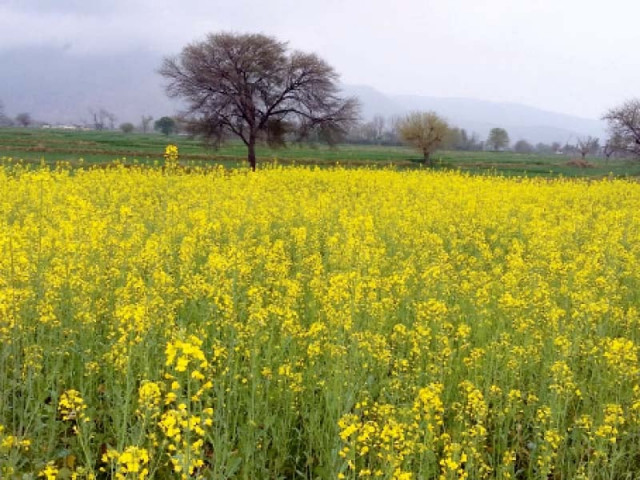In full bloom: Mustard crop paints Hazara yellow, brightens farmers’ day
Farmers hope recent spell of rain yields bumper crop this year

A mustard field in Haripur. PHOTO: EXPRESS
The crop is in full bloom and triggered a wave of optimism among farmers. Bashir, a farmer, told The Express Tribune he was delighted the rain had increased chances of a better crop this year.
A walk to remember
A quick walk through the lush green and yellow mustards fields presents a breathtaking view that attracts people from all corners of the division, even the urban areas.
A large number of people from urban areas throng to these fields, pull out their cameras and take photographs against the picturesque background. Some of them pick spinach and sinji ka saag, which grows organically along with mustard.
Countryside chronicles
Haripur, Abbottabad, Mansehra and Battagram districts in Hazara are famous for the crop. It is sown both separately and as a mixed crop with wheat between October and November every year.
Apart from using it as fodder and in the form of cakes to feed cattle, residents use extractions from the crop for edible oil, mustard oil, pickling, hair care and other medicinal purposes.
In Hazara’s countryside, the plant is used as a vegetable for sarson ka saag or with lassi and butter, especially before going into fruition.
Mustard yield
Speaking to The Express Tribune, Nisar Ahmed, an official of the agriculture department, said mustard is sown on 699 hectares of land in these districts.
“In Haripur, 516 hectares of land are set aside for the crop and total yield is 205 tonnes annually.” On the other hand, wheat is sown on 98,817 hectares of land.
“The total yield of wheat in Hazara is 195,893 tonnes,” he added.
Published in The Express Tribune, March 13th, 2016.













COMMENTS
Comments are moderated and generally will be posted if they are on-topic and not abusive.
For more information, please see our Comments FAQ